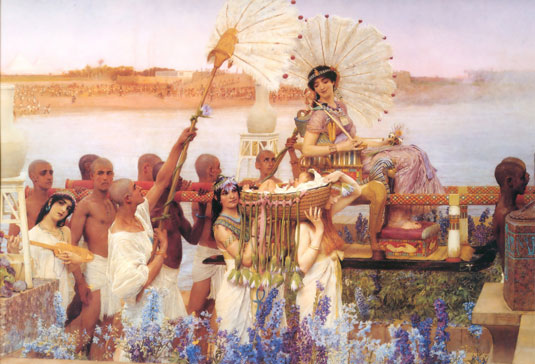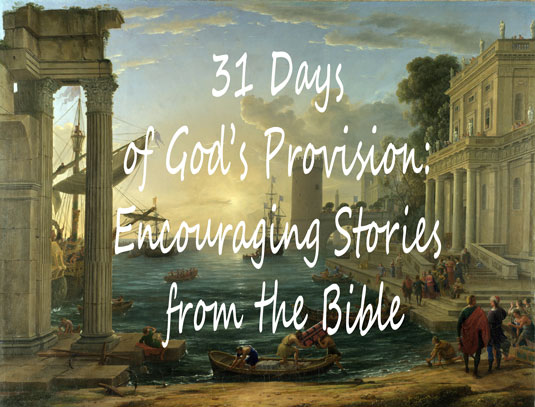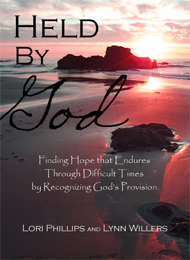 The story of Moses begins in the Old Testament book of Exodus. Several generations before, Jewish patriarch Jacob had moved his family to Egypt, where his son Joseph held a prominent role in the Egyptian government. This move included eleven additional sons, their wives and children, all of which numbered about 70 people. Over the years, the Hebrew families prosper in their new homeland. God blesses them and they multiply… a lot. Several generations later, the number of Israelites in the land is so numerous, that it begins to worry the Egyptian officials.
The story of Moses begins in the Old Testament book of Exodus. Several generations before, Jewish patriarch Jacob had moved his family to Egypt, where his son Joseph held a prominent role in the Egyptian government. This move included eleven additional sons, their wives and children, all of which numbered about 70 people. Over the years, the Hebrew families prosper in their new homeland. God blesses them and they multiply… a lot. Several generations later, the number of Israelites in the land is so numerous, that it begins to worry the Egyptian officials.
Around this time a new king comes to power, and he is either too young or too conceited to care about the Egyptian prosperity which had occurred under the wise administration of Joseph. He cares nothing for Joseph, and for the Hebrew people—he cares even less.
“Look,” he said to his people, “the Israelites have become far too numerous for us. Come, we must deal shrewdly with them or they will become even more numerous and, if war breaks out, will join our enemies, fight against us and leave the country.” Exodus 1:9-10, NIV
What the king really wants is a silent labor force that he can easily manipulate and control. And so the Hebrews are enslaved.
So they put slave masters over them to oppress them with forced labor, and they built Pithom and Rameses as store cities for Pharaoh. But the more they were oppressed, the more they multiplied and spread; so the Egyptians came to dread the Israelites and worked them ruthlessly. They made their lives bitter with harsh labor in brick and mortar and with all kinds of work in the fields; in all their harsh labor the Egyptians worked them ruthlessly. Exodus 1:11-14, NIV
In an effort to further control the burgeoning Hebrew population, the king instructs the midwives to murder all male children born to Israelite women, but to allow all female children to live. Fearing God more than Pharaoh, the midwives refuse to do as he commands. After realizing that his first order has been ignored, the king issues his second command nation-wide.
Then Pharaoh gave this order to all his people: “Every Hebrew boy that is born you must throw into the Nile, but let every girl live.” Exodus 1:22, NIV
Life just got a whole lot more complicated. For many Hebrew women, the blessing of pregnancy is now a nightmare. They had nine long months to wait and wonder. Would they be celebrating the birthday of their baby daughter, or mourning the death of their baby son?
It is into this grim society that Moses is born. His mother already has two little ones at home when she finds herself pregnant once again. Her toddler Aaron is almost three, and has already become quite the little talker. Miriam is her outspoken oldest child, bold and smart as a whip. Such blessings from God these children are. And now she is blessed once again, but what will she do if the child is a boy? How will she protect him? How long can she keep him hidden? What an overwhelming situation. How does she maintain hope in such hopeless circumstances?
The day of the birth arrives, and the Israelite woman indeed bears a son. For the first few months she keeps him well hidden, lest anyone should report her. But eventually she knows she needs a plan. Praying for guidance, the Hebrew mother applies tar and pitch to a basket, making it water-tight. She kisses her sweet boy, places her newborn son into the basket, and gently pushes it into the reeds growing along the bank of the Nile River. Older sister Miriam watches the basket from a distance.
Then Pharaoh’s daughter went down to the Nile to bathe, and her attendants were walking along the riverbank. She saw the basket among the reeds and sent her female slave to get it. She opened it and saw the baby. He was crying, and she felt sorry for him. “This is one of the Hebrew babies,” she said. Exodus 2:5-6, NIV
Miriam emerges from her vantage point, and approaches the princess to offer assistance.
Then his sister asked Pharaoh’s daughter, “Shall I go and get one of the Hebrew women to nurse the baby for you?” “Yes, go,” she answered. So the girl went and got the baby’s mother. Pharaoh’s daughter said to her, “Take this baby and nurse him for me, and I will pay you.” So the woman took the baby and nursed him. Exodus 2:7-9, NIV
What a turn of events. Her son, once destined for death, now has the protection of Pharaoh’s daughter! Although she knows that her time with Moses will be temporary, she also knows that he will live.
When the child grew older, she took him to Pharaoh’s daughter and he became her son. She named him Moses, saying, “I drew him out of the water.” Exodus 2:10, NIV
Moses grows up in the household of Pharaoh’s daughter. Not only does he thrive, but he is schooled in Egyptian language, history and culture.
In years to come, God will use the adopted Hebrew son of an Egyptian princess to lead all of the Israelites out of bondage and to the Promised Land.
His mother could never have imagined that the mortal danger surrounding the birth of her son would be circumvented by a prayer and a basket.
Moses’s story was one of hopelessness, but God’s provision was one of hope.
Join me tomorrow for a story involving a wicked queen, a loaf of bread, and a provision of rest!
 If you’ve missed any part of this series, you can find all of the posts in the side bar category 31 Days of God’s Provision.
If you’ve missed any part of this series, you can find all of the posts in the side bar category 31 Days of God’s Provision.
On the journey toward Home,












{ 1 trackback }